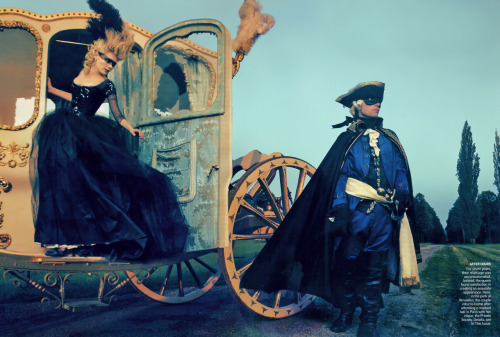
I find it odd that one of the most recognizable (and vilified) figures in history has only been portrayed on screen a handful of times - and usually with very little success. Marie Antoinette: a name that instantly conjures images of cake, frocks, and decapitation - interesting stuff, to say the least. Then why is it that she is so woefully unrepresented on celluloid? The French Revolution is easily one of the most exciting - not to mention violent - periods that we have records of. Historical biopics are almost always a guaranteed cash cow, too. Recent middlebrow juggernaut The King's Speech cleaned up at the box office and at the podium. Films depicting the lives of Christ, Ghandi, Lincoln, hell, even the Marquis de Sade, have all yielded plush returns. So why does the story of a beautiful, decadent renegade with a soft-spot for the arts remain so relatively untouched?
Perhaps, because most filmmakers don't know how to approach her. The spoiled Austrian ingenue; wanton party maven; martyred wife and mother; demonic pastry supporter; they are all completely viable approaches to take. Sophia Coppola, nobly tried them all. Her film was critically panned, but has achieved near cult status in the subsequent five years since its release. Basing the 'narrative' on Antonia Fraser's sympathetic and brilliant biography "Marie Antoinette: The Journey," and working with her largest budget yet, Coppola was granted unprecedented access to the grounds and artifacts of Versaille, bestowing the incredible visuals with a near infinite level of depth and detail. Kirsten Dunst turns in another fine performance in the title role. Her development is convincing, deeply aided by her range of expression: angelic innocence that can instantly turn mischievous and feline. It's a modern performance, but that's the point, easily overshadowing earlier incarnations.
Norma Shearer's mannered performance from 1938 remained unchallenged for nearly seventy years until Joely Richardson laced her lithe frame into the doomed corset. The disastrous Affair of the Necklace overextends a minor entrapment scheme that (fictitciously) lead our girl to her execution. Given mere minutes of screen time, Richardson tried admirably to make her Marie complex, but alas, it was all in vain as the star here is a "sexy" turn by Hilary Swank. The only business that SWANK has in a period piece is pulling a carriage.

We all know of the carnage and the conspiracy, so instead Sophia gives us the early years, deciding to end the film when the royal family are forced into hiding. It's a bold choice, one that results in a vibe more akin to Kubrick's Barry Lyndon then, say, The Count of Monte Cristo. Though, it still makes a fine bodice-ripper, sensually portraying the Queen's ongoing affair with a handsome officer set, of course, to the erotic throb of Adam Ant. Ah yes, the music: the point which continues to divide audiences and critics. Why would she choose to take on every conceivable period detail and then seemingly throw it all away with a disposable, however terrific, post-punk soundtrack? To demonstrate the universal qualities of what is essentially a coming-of-age story? To mirror her own alienation as a princess of Hollywood? I pick the latter, as it's only logical to assume that the young director would identify with another privileged party girl of great expectations. If it seems gimmicky, and at times it is (the strokes blaring pointlessly as Dunst minces down a corridor), the gambit is sometimes incredibly effective (Siouxsie and the Banshees commanding the dance floor at a masquerade ball; New Order chiming in for an all night birthday party).
Despite the deliberate anachronisms, the film is essentially historically accurate in what it decides to show. And that, for better or worse, is Coppola's style: what she decides to show. Her characters never march to a traditional narrative, rather, they run along a chain of moments; sometimes restrained, usually intimate, always beautifully photographed. For now, hers is the only essential Marie Antoinette film. Coppola even stated her disinterest in filming the later part of the Queen's life, stating that that responsibility belonged to another filmmaker. Catherine Briellat and Andrea Arnold I'm looking at you.
-El Yacht

No comments:
Post a Comment